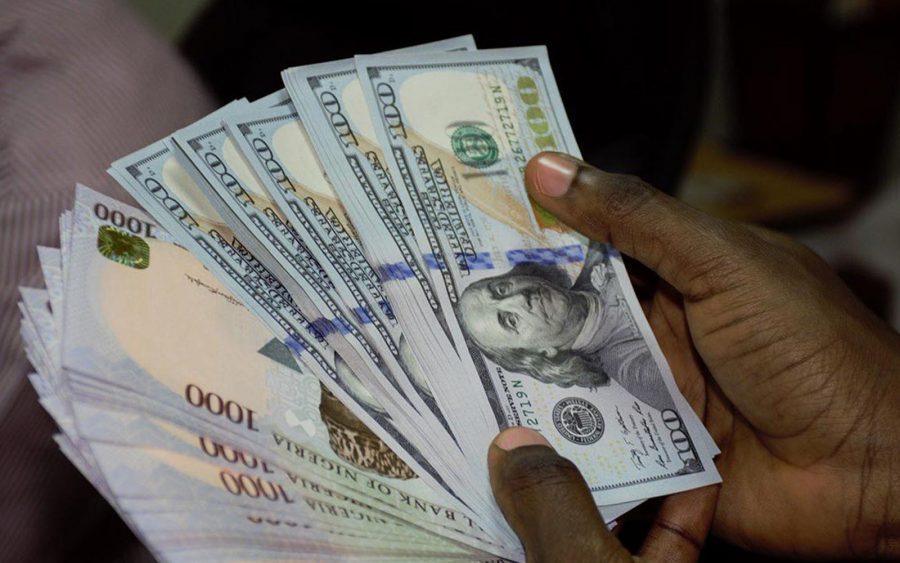At the black market, the Naira remained stable against the dollar to close at N465/$1 on Tuesday.

By
Chike OlisahForex turnover rose by 173% as Nigeria’s
exchange rate at the NAFEX window remained stable against the dollar to
close at N385.67/$1 during intra-day trading on Tuesday, November 10.
Also, the naira remained stable against the dollar, closing at
N465/$1 at the parallel market on Tuesday, November 10, 2020, as Bureau
De Change operators get another round of dollar supply from the Central
Bank of Nigeria.
Parallel market: According to information from
Abokifx – a prominent FX tracking website, at the black market where
forex is traded unofficially, the Naira remained stable against the
dollar to close at N465/$1 on Tuesday.
This was exactly the same rate that it exchanged for on Monday, November 9.
- The local currency had strengthened by about 7.8% within one week in
September at the black market, as the CBN introduced some measures
targeted at exporters and importers.
- This was so as to try to boost the supply of dollars in the foreign
exchange market, and reduce the high demand for forex by traders.
- The CBN has sold over $500 million to BDCs since they resumed forex sales on Monday, September 7, 2020.
- This was expected to inject more liquidity to the retail end of the
foreign exchange market and discourage hoarding and speculation.
- However, the exchange rate against the dollar has remained volatile
after the initial gains made, following the CBN’s resumption of sales of
dollars to the BDCs.
- The President of the Association of Bureau De Change Operators, Aminu Gwadebe, said he expects the impact of the extra liquidity in the market to be gradual.
- Despite the drop in speculative buying of foreign exchange, the huge
demand backlog by manufacturers and foreign investors still puts
pressure and creates a volatile situation in the foreign exchange
market.
NAFEX: The Naira remained stable against the dollar at the Investors and Exporters (I&E) window on Tuesday, closing at N385.67/$1.
- This was the same rate that it exchanged for on Monday, November 9.
- The opening indicative rate was N385.83 to a dollar on Tuesday. This
represents a 38 kobo gain when compared to the N386.21 that was
recorded on Monday.
- The N393.57 to a dollar was the highest rate during intra-day
trading before it closed at N385.67 to a dollar. It also sold for as low
as N380/$1 during intraday trading.
- Forex turnover: Forex turnover at the Investor and Exporters (I&E) window rose by 173% on Tuesday, November 10, 2020.
- According to the data tracked by Nairametrics from
FMDQ, forex turnover rose from $51.62 million on Monday, November 9,
2020, to $140.95 million on Tuesday, November 10, 2020.
- The CBN is still struggling to clear the backlog of foreign exchange
demand, especially by foreign investors wishing to repatriate their
funds.
- The increase in dollar supply after the previous trading day’s drop
reinforces the volatility of the foreign exchange market. The supply of
dollars has been on a decline for months due to low oil prices and the
absence of foreign capital inflow into the country.
- As part of the measures to check forex abuse and illegal
transactions, the CBN last month directed the freezing of accounts of
about 38 companies.
- The average daily forex sale for last week was about $169.93
million, which represents a huge increase from the $34.5 million that
was recorded the previous week.
- Total forex trading at the NAFEX window in the month of September
was about $1.98 billion, compared to $843.97 million in August.
- The exchange rate is still being affected by low oil prices, dollar
scarcity, a backlog of forex demand, and a shaky economy that has been
hit by the coronavirus pandemic.
Chike Olisah is a graduate of accountancy with over
15 years working experience in the financial service sector. He has
worked in research and marketing departments of three top commercial
banks. Chike is a senior member of the Nairametrics Editorial Team.
You may contact him via his email- chike.olisah@nairametrics.com.





No comments :
Post a Comment